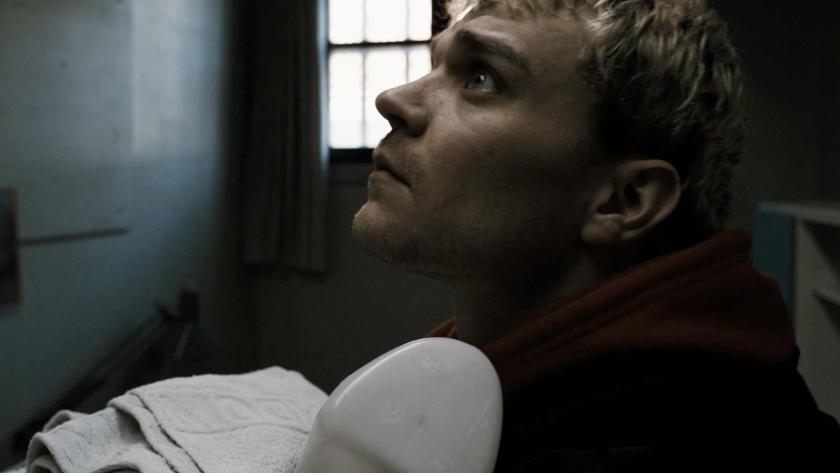You must have come across those “happiness quotient” surveys, which judge the relative achievements on the contentment front across a series of countries. The last one I recall gave Denmark the Number One spot, with a remarkable 96 per cent classing themselves as lykkelig, as the feel-good factor is known locally. If you were left wondering about the other four per cent, Michael Noer and Tobias Lindholm’s R: Hit First, Hit Harder offers some clues.
In fact, there’s little that looks specifically Danish here (though the film swept the board at this year's Danish Oscars), except a certain greyness and coldness – the film’s action, taking place with no apparent seasonal variations in some sort of nasty autumn, rarely indeed shows the sun. It’s a prison drama, and the inevitable comparison to be made is with Jacques Audiard’s slightly earlier A Prophet; I seem to remember a little bit more visual brightness in that work, however, as well as a sense of a world outside into which Audiard’s hero returns towards the end of the film. A Prophet also had more of a sense of its inmates, though arranged in roughly the same hierarchies of prison power as in Noer and Lindholm’s film, being more clearly part of external criminal-gang structures.
The hero of the Danish film is the eponymous “R” of the title – short for its main protagonist Rune, who’s rarely off screen and is very strongly played by Pilou Asbæk (for the record, the international release's title was just that first letter, with the addition of "Hit First, Hit Harder” for the UK, arguably the kind of Hollywood-style add-on that seems out of place). R opens with the twentysomething blond Rune, who has a kind of boyish charm to him, arriving at Horsens prison (a recently closed real prison, where the film was shot), and placed in its worst wing with the lifers, even though he’s only on a two-year sentence for knife crime (apparently his first offence). Nor does he seem to have come out of the nowhere-world of carehomes – there’s a grandmother at least who comes to visit, though she may not have had a very strong influence on him, and he’s got photos of a girlfriend. So, though it’s little specified, not as bleak an upbringing as often to be found in such stories.
 The bleakness inside is far more remorseless. The ward that contains the local prisoners is run by a particularly sadistic lieutenant, known as “The Mason”, who sets the rules for new arrivals, and keeps control for his own boss, who actually seems less horrible. Induction for Rune is to beat to a pulp a prisoner from the other wing which houses foreign, including Arab and Albanian, inmates. These opponents, however brutal they are to one another, have a curiously symbiotic relationship – the Danes provide the drugs, the foreigners pay in cash. How either of these items actually arrive on prison territory is something R chooses not to touch on; another element missing is any whiff of homosexual tension, possibly surprising in a genre in which male testosterone is usually pretty rampant, and domination is achieved not only by physical violence.
The bleakness inside is far more remorseless. The ward that contains the local prisoners is run by a particularly sadistic lieutenant, known as “The Mason”, who sets the rules for new arrivals, and keeps control for his own boss, who actually seems less horrible. Induction for Rune is to beat to a pulp a prisoner from the other wing which houses foreign, including Arab and Albanian, inmates. These opponents, however brutal they are to one another, have a curiously symbiotic relationship – the Danes provide the drugs, the foreigners pay in cash. How either of these items actually arrive on prison territory is something R chooses not to touch on; another element missing is any whiff of homosexual tension, possibly surprising in a genre in which male testosterone is usually pretty rampant, and domination is achieved not only by physical violence.
The only element of anything like affection is found in Rune’s friendship with Rashid (another “R” of the title), another junior on a short sentence, one that's nearly at its end. Working together in the kitchens, they come up with a plan that gives them considerably higher status in their communities. The film’s mood – and accompanying weather – duly cheers up, with the rival factions engaging with each other at football in their prison-yard breaks.
It also sees Rune, who has proved himself as a problem-solver, almost accepted within the ranks of the seniors on his ward. That comes across most strongly in a scene, gentle and humorous, in which this group of hardened and heavily tattoed thugs themselves play football, but in the form of a match between two canaries in a cage (you have to watch the film to get how this works). It may verge on the sentimental, and the metaphor of birds in a cage isn’t the most original one, but it does speak somehow to the existence of a better kind of feelings that might exist beyond the prison’s barred windows.
It’s all the more powerful because it comes just before a very dark denouement indeed, in which greed, power and betrayal all return to dominate. The film’s two young protagonists don’t learn from their prison experience, but are crushed remorselessly in its wheels. Small consolation may come if you manage to treat the ending as in some way proof that they do actually stay true to one another.
It’s as bleak a ride as they come, with a compelling authenticity derived not least from the fact that the prison’s ex-inmates and guards play many of the supporting roles. Music is spare and when it appears seems like a kind of industrial buzzing sound that’s very unsettling, while lensing from Magnus Nordenhof Jonck is outstanding in its evocation of claustrophobia.















Add comment